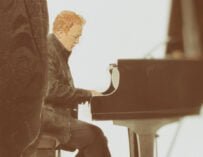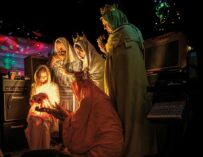
The Wombles at Christmas. Mike Batt: “I was naturally writing from the point of view of a Womble.”
We head to Wimbledon Common to hear about how the most successful singles act of 1974 created a festive favourite
Mike Batt is a singer, songwriter, producer and composer who has been making hit records for more than fifty years – earning five Ivor Novello Awards along the way. Artists he’s worked with include a glittering array of top talent such as Art Garfunkel, Jeff Lynne, George Harrison, and Katie Melua. Some of his key compositions include Garfunkel’s chart-topping Bright Eyes, David Essex’s A Winter’s Tale (co-written with Tim Rice), and I Feel Like Buddy Holly by Alvin Stardust. While working with Melua, he wrote her signature songs, The Closest Thing To Crazy and Nine Million Bicycles.
Batt is also the creative force behind the music of The Wombles. Originally appearing in a series of children’s books in the late 1960s, Batt wrote, recorded, and produced the songs that would play such a large part in the television adaptation of the 1970s, including the catchy theme, The Wombling Song. Such was the music’s appeal, that The Wombles were the most successful singles act of 1974, with songs in the UK charts for more weeks than any other act. Their highest-charting effort came with the festive favourite Wombling Merry Christmas, and here, Mike reveals all about the song’s creation…
Mike Batt on finding meaning in your songs

Released: November 1974
Artist: The Wombles
Label: CBS
Songwriter: Mike Batt
Producer: Mike Batt
UK Chart Position: 2
US Chart Position: –
“Liberty Records was a big American company starting up in England. I’d applied to be signed as an artist, and I got signed as a songwriter, then eventually as an artist. Ray Williams was the 20-year-old head of A&R, I was maybe 17 years old, but he left, and eventually ended up managing Elton [John] and there was a space. The managing director said, ‘Right, give him the job, head of A&R.’
“I was suddenly thrust into the commercial world of Swinging London in the late 60s, and a lot of very good… I would say, psychedelic experiences – except it gave me a feeling that I was dropping acid all the time, which I wasn’t, and dope used to make me sick. My psychedelia had to come from within.
“I did a lot of that, and then I left, and was making my living doing anything that came along. I wanted to do my self-taught craft of being an arranger and conductor. I had never been to music school, but that was my big want – to be good at arranging and conducting, as well as producing and singing. I was teaching myself from books, and I was doing whatever jobs came along. I did a little bit of work with Jeff Lynne for The Idle Race and I did Family’s first arrangements.
“I had an agent for jingles, as I did Guinness, Harmony Hairspray, and Unigate milk. My agent rang me up. She said, ‘They’re doing this thing called The Wombles for the BBC. Do you fancy going and having a chat with them, because they’d like to talk to you?’ In those days, you didn’t pitch. They just rang someone they wanted to do it, and through my agent, they decided to have me.
“I went along to the production company. They said, ‘We’d like a tune.’ I said, ‘Great, I’d love to write you a tune, but…’ I really loved these characters, because they showed me the models and the sets. I read a bit of the book, and said, ‘I’d really like to write a song so that kids would learn a bit about the characters, and people might start singing it,’ simple as that.
“They said, ‘Yeah, that sounds like a good idea. Let’s do that.’ So, I wrote The Wombling Song. People call it Underground Overground but It’s actually called The Wombling Song. I’d been in the music business for five years by then, I was 23 and struggling to have a hit; getting close sometimes, and having fun arranging and producing other people. That was my first hit and I decided, ‘Right, if I’ve got some traction with an act…’ although, it happened to be me dressed up as a large mouse.
“It was quite fun. I’d been doing quite heavy-duty rock, with symphonic overtones. I was totally symphonic but I was also totally rock and totally pop. That’s half the trouble, really, because I’m totally into whatever I do and that sometimes manifests itself in every record. In fact, coming back to the absolute hub of what we’re talking about, I suppose that all manifested on Wombling Merry Christmas.
“You’ve got the big strings, you’ve got the heavy-duty, chunky, rhythm going underneath – which is a damped fifth. We used to call them ‘chugs’ on the guitar. I’d write chugs on the part, the chords, and put them to Chris Spedding, a famous guitar player doing sessions. He’s the guy who produced the Sex Pistols’ first demos, and he was very much the coolest person in the room.
“I used to hire him to be my guitar player. I would say to him, ‘Okay, this one needs chugs.’ I found the multi-track the other day; the first take he was doing, it sounded fine but didn’t have what I call ‘grip.’ I used to like this almost ignorant sound of his. I suppose that’s what made him go into punk. It was an open sound, and I said, ‘I don’t suppose you could play damped, could you?’ That drove the record along perfectly.
“But let’s jump from having had the first hit with The Wombles to a very mad year. I know it sounds braggy, but we became the biggest-selling singles group of 1974. More than the Bay City Rollers, more than even Paul McCartney and David Bowie. I mean, they probably weren’t making many singles that year or something, but it was a great accolade.
“Anyway, so how do I write it? This delightful guy, Dick Asher – he looked like a Mafiosi family boss, and he behaved like that as well. He had this New York drawl and was a very strong, heavy-duty executive who was the head of CBS. He rang me up and he said, ‘Hey, Mike, we need the new Womble album!’ I said, ‘Oh yeah, that sounds sensible.’ But I said, ‘It’s getting a bit close now. When do you want it by?’ He said, ‘Well, six weeks would be good.’ In the middle of September, I started writing. We recorded it in October 1974, and it went out for Christmas.
“Keep On Wombling is one of my favourite albums. I wrote all that stuff in a very short time. I think that speaks to what I do because I actually love a deadline. The adrenaline and the feeling that it’s going to be out soon, all of that. So, I set to it, and I started doing it. We would have done it in a few sessions, we might have done three or four songs in a three-hour session.
“I must have had Roy Wood/[Wizard’s] I Wish It Could Be Christmas Everyday ringing in my ears because that is also an up-tempo shuffle. The Bay City Rollers were serving up that kind of stuff too with Shang-a-Lang, all that kind of stuff. That was my competition… Mud, Bay City Rollers, Slade, Wizard…

Mike Batt: “Even though I never do it on purpose, I think there is a sort of natural melancholy in a lot of the things I do.”
“I was making what I hoped would be something uplifting. I’ve always been very strong on lyrics. When I say strong, I don’t mean good as a writer, although I’d like to think some people thought I was okay at it, but it’s always been very important to me that the lyrics say something – I don’t mean give out a worldly message, necessarily, just trying to write what might be a good single.
“People have told me there’s a kind of melancholy running through it: ‘Open your eyes, look to the skies when you’re lonely/There will be stars shining for you…’ Even though I never do it on purpose, I think there is a sort of natural melancholy in a lot of the things I do, even if they’re supposed to be cheerful. And it was supposed to be cheerful. But a lot of people say that they find an emotion in that song, and I can see what they mean.
“‘…There is a sound of a symphony… I’ll tune into you, you tune in to me.’ I’m rhyming ‘symphony,’ with ‘into me.’ I just about get away with the rhyme but it’s a bit cheeky. It’s not really a perfect rhyme, but neither is it terrible. There is definitely a feeling of looking up in the sky and waiting for Father Christmas to come, but actually it all being about human emotions – even if you’re wearing a Womble costume. I think it does connect emotionally.
“I’d been in the business for about five years by then, and writing songs since I was 16 or so. I’ve learned more about this since then, when I’ve been writing for movies, but as a songwriter, you are an actor. For example, I’ve written Caravan Song which was for a girl who went off into the desert because she was fed up of living in Pennsylvania and being your average person from Middle America. She wanted to go and get some adventure and find romance. I had to get into the head of that girl and write the song from her perspective.
“Same thing when I was writing Womble songs, not deliberately, I was naturally writing from the point of view of a Womble. I didn’t go, ‘I know I’ll write a Christmas hit, and then I’ll put “Womble” in.’ I was a Womble. I was Orinoco writing that song – because I was the lead singer and I always wore the Orinoco costume; the one with a red scarf mucking about with the microphone like Rod Stewart.
“I once stage dived. We went on The Word TV show with Terry Christian and I stage-dived into the audience at the end. Instead of catching me, they parted like the Red Sea and I smashed right onto the floor. Luckily, I was wearing my Womble padding so I didn’t get hurt. I’ve never dived into an audience since.
“I did a stupid version of it with Roy Wood. We mashed it up with I Wish It Could Be Christmas Everyday, and made up a song called, I Wish It Could Be A Wombling Merry Christmas Everyday, which was just silly, but we were feeling in a silly mood. I rang him up and asked him if he’d like to have a go at it and he thought it was a brilliant idea. I did the same with Noddy Holder, and he told me to fuck off – in the nicest possible way. I think he probably made the right decision, because the record Roy and I made was a silly mash-up.

Mike Batt: “It’s definitely the sort of song you could do in a pub and everybody knows it.”
“From a writing point of view, I’m always big on the title being part of the hook. Whenever I’ve been working with songwriters, particularly when I was working with Katie Melua, if I’d hear a song that she’d brought in, I’d think, ‘Yeah, it could be great, but what about trying to get the hook to bear the words of the main message of the song?’ ‘All day long we will be Wombling in the snow,’ that’s kind of catchy, but the main bit is, ‘We wish you a Wombling Merry Christmas.’ Funnily enough, that’s also the bit that sounds almost sad.
“I do remember that I wanted it to be a song that had the real feeling of Christmas and goodwill, and anyone who wasn’t with friends, you know – there’s still Christmas and there’s still goodwill and to feel some of it, somehow. There was a genuine feeling of a song of hope and happiness. The music, it just tumbled out of me because I was in such a hurry. We wrote and produced the whole album in six weeks. And I said, ‘Is that six weeks till I deliver the master?’ He said, ‘Well, I’d like it to be six weeks till it’s in the shops.’ He rang me in mid-September and it was out in November.
“That was the highest-charting Wombles song. No 2. and kept off by those bastards Mud… Somebody put on some terrible Womble shows. I didn’t have control over the entire copyright of the Wombles. I had it for the band and music, but the original copyright owners had a license to do a stage show. They did shows and they were so terrible, and they were reported in the papers as being so, that our sales dropped off. We were doing something like 50,000 records a day, and the day after, when that story broke, which had nothing to do with my Wombles but cheap copies all over the country, our sales dropped to 25,000 a day. It was still great, but it wasn’t as much as Mud was selling. Of course, I’m not bitter and twisted about having a No. 2 record.
“I’m very proud of it. It gives me a good feeling to hear it. I suppose it’s quite good to be reminded that you’ve had some big hits. When it comes on at Christmas…I got the right balance between being sad, hopeful, and jolly. It is quite good for uplifting people and I like that about it.
“The British persona is not to be snobby about things like that and to join in. If I’m doing a serious concert of my own, with Bright Eyes, A Winter’s Tale, or Railway Hotel… if I suddenly sit down at the keyboard and romp into, ‘Underground, overground…’ everyone joins in and starts clapping. It doesn’t matter who they are, they all know all the words. It’s the same with Wombling Merry Christmas. It’s definitely the sort of song you could do in a pub and everybody knows it, even if they’ve never really experienced the Wombles.
“It became a national treasure thing, didn’t it. When you hear it in the supermarket when you’re running around trying to find some spuds at the last minute for Christmas lunch, it’s just a nice feeling.”




































Related Articles